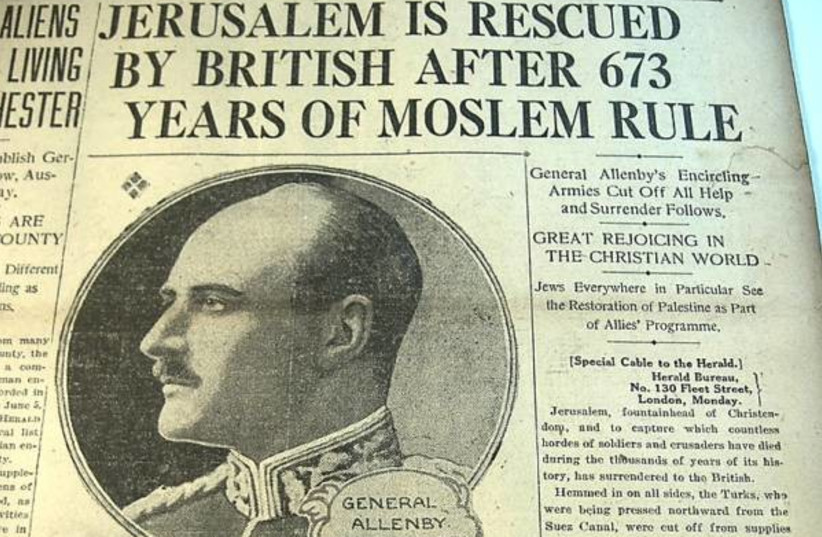107 years after Moshe Efroni was killed in the First World War, which he was forced into as an unwilling member of the Ottoman army, his great-grandson, Paz Efroni, is asking the Defense Ministry to recognize him as a member of Israel's defense systems.
"This is how historical justice will be achieved for him," Paz said. "We ask that his name and memory be mentioned in the memorial ceremonies and in the archives. The family has no desire to receive compensation or money, but only that the state give him the last respect that he and his bereaved family are entitled to."
In 1915, at the outbreak of the First World War, Moshe Efroni (Nechayev) was forcibly recruited to the Ottoman army. Like others who were forced to enlist, he was presented with the option of being drafted or being deported back to Russia with his entire family.
He was sent to the battalions on Mount Sinai and the Negev, where he was assigned jobs such as laying railroads, digging positions and paving roads.

Forced soldiers, including Efroni, suffered from harsh conditions of hunger, plagues and diseases, and as a result, the mortality among them was high.
Efroni's death
Efroni fell ill with typhoid fever at this time. He was evacuated shortly thereafter to Beersheba where he was pronounced dead. His body was buried in a mass grave in Rishon Lezion, along with others like him who died from this plague.
The tombstone reads: "The missing soldier, brought to burial from the southern Turkish front in 1915."
Efroni, one of the pioneers of the first aliyah, immigrated with his family from Russia between 1902-1903. They settled and were among the founders of the Sjara settlement in the Lower Galilee, known today as Ilanya.
Efroni and his wife Sarah raised four children and earned a living from farming. They were among the community of the Russian Geri HaTzedek, whose origin was from a number of Christian sects, and they chose to join Judaism of their own free will, and after a process of adopting the customs of Judaism, they converted.
Most of them came to the Galilee and their contribution to agriculture and the establishment of the colonies was unquestioned.
Not recognized as a member of Israel's systems
Although he died under security-related circumstances, he was never recognized as a member of Israel's systems, neither by the Jewish settlement before the establishment of the state nor by the state institutions after its establishment. His widow and children also never received recognition, support or assistance - financial or otherwise.
Now, Paz said that "during his service in the Turkish army, my great-grandmother and her 15-year-old eldest son had to work the farm alone and their livelihood was severely damaged to the point of starvation. Even after the family learned of his death, it survived with great difficulty and in dire straits without the father of the family and without any assistance from the institutions of the Jewish community."
From an inspection conducted at the "Yizkor" commemoration site, where all the martyrs of Israel's systems are documented, it appears that fallen citizens of Israel who died under exactly the same circumstances were also recognized by the state.
For example, Dr. Gershon (Isaac) Krishevsky and Dr. Menachem (Marek) Stein were recruited and placed in the Hospital for Infectious Diseases in Jerusalem. In their work, they fell ill with typhus and died.
"The missing soldier, brought to burial from the southern Turkish front in 1915."
Inscription on Efroni's tombstone
Eliyahu-Joshua Rivlin, who was sent as a pharmacist's assistant to Beersheba and died after being infected with cholera while treating sick soldiers, was also recognized as a member of Israel's systems.
Now, nearly 110 years after his death, the family of Moshe Efroni is asking for recognition of him as a member of Israel's systems. The family had already submitted a similar request in 2019, when it was rejected. In the appeal this time, the family reached out for help from historian Dr. Esti Yankelevich and lawyer Itamar Ben Zeev.
The Defense Ministry stated that "following a professional committee that examined the recognition of the victims who fell before the establishment of the state as victims of the Israeli system and in light of the family's request, the request for the recognition of the late Mr. Efroni will be brought up for reconsideration before a committee of experts. Once the exam is completed and a decision is made, an orderly answer will be sent to the applicants."
